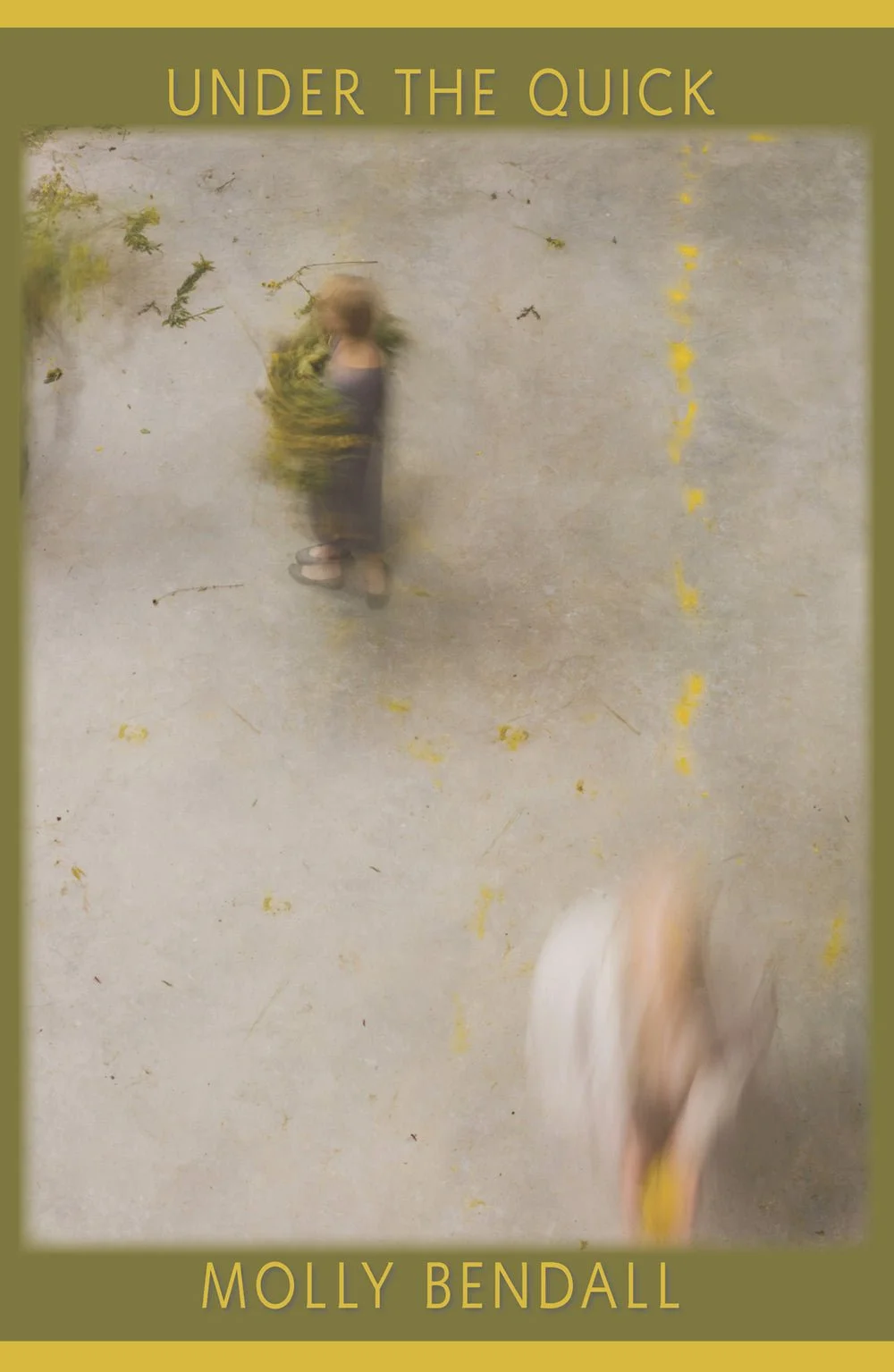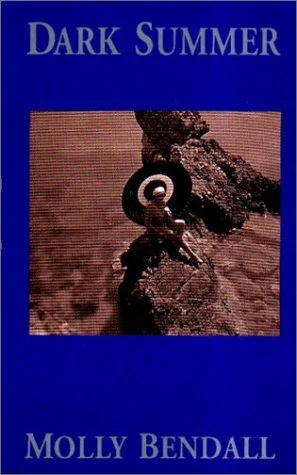
MOLLY BENDALL
BOOKS
WATCHFUL
Omnidawn (2016)
Purchase: Omnidawn or Bookshop
“Molly Bendall’s Watchful, her fifth poetry collection, is an elegant addition to the field of ecopoetics. Her subject is animals, but she shows them blurred, like glimpses of the legs of Eadweard Muybridge’s running horses in his well-known nineteenth-century Horses in Motion. Animals are extraordinary creatures from whom we are separated by gulfs of ignorance. The result of human, often willful, misunderstanding is the threatened survival of many species in a time widely regarded as the sixth great extinction. Bendall’s fragmented gaze protects its objects, the shimmer of the language concealing the entire creature. At the same time she suggests that familiarity, disrupted, makes possible a more intense and authentic vision by allowing freedom from complacent, destructive narratives.”
—Karen Kevorkian review in Colorado Review
“Fed up with a philosophical tradition that failed to think outside the human, Jacques Derrida once admitted, ‘thinking concerning the animal, if there is such a thing, derives from poetry.’ Molly Bendall’s Watchful heeds this call with the urgency of a zoo leopard clawing at a glass wall—and with the guilt-tinged fascination of a paying spectator. ‘How do we look now / In the roped off area?’ is the book’s driving provocation as its speaker confronts the uncanniness of captivity and species difference at the Los Angeles Zoo. Flinchingly inhabiting a human gaze haunted by extinction, capitalism, carceral impulses, and environmental crisis, Bendall’s spare lyricism interrogates the tense but tender kinship between human animals and their strange and estranged cohabiters of an endangered earth.”
—Liz Bowen review in Boston Review
“Bendall manages, through deft slippages of syntax, pronouns, and agency, to create texts that seem translated from animal as well as from human consciousness, in ways that often blur those realms, suggesting radical otherness and unsettling similarities. Who is watching what or whom in these poems? At times, the speaker is a ‘trespass[er]’: ‘I come here to teach my ear to adore, / shape myself as orphan.’ At others, the speaker is a hunter/predator in scenarios all too human: ‘Understand the lure,’ she writes in ‘Trespass’: ‘I daughter myself, I girl the most / delicate ones, creep up to them nearer the forelocks and the swarming flies.’ The humans and the animals are, in these poems, both ‘almost on guard, ready to hurry.’ As Bendall writes in ‘Animal Radiance,’ ‘Fur can glare, even hurt.’”
—Lisa Russ Spaar in On the Seawall
"Molly Bendall’s new book, Watchful, sparkles with sagesse, a ‘knowingness’ of animal wisdom. At the same time, there is a current of unknowingness and mystery here that runs counter to intuitive ‘animal’ knowledge - as the collection’s epigraph has it: ‘something from which, as a human being (I) shall be forever excluded.’ Bendall uses this sense of exclusivity as both a watchful removed ‘eye’ in language—and a dazzling linguistic parody of the ‘human’: ‘There’s still a self/like your self on a dusty hill around the world. Leaves evaporate kindly and don’t trouble our alphabet game.’”
—Carol Muske-Dukes in The Huffington Post
“Watchful thus puts Bendall in the ranks of artists who are serious about subverting the habit of law, breaking with accepted ‘refrains’ (‘And I shook off / the refrains I’d carried / for so long,’) In her case, for no less a reason than extending human identity into the pre- and extra-human in the interest of breaking narrow, exploitative confines, not to mention for the sublime sake of wonder. Becoming animal, the mix of the animal and the human, of the primal and the present, is her assemblage.”
—Calvin Bedient in Lana Turner Journal
“‘How do we look now/In the roped-off area?’ A zoological refraction, Watchful asks how we see from within the structures we’ve built to separate ourselves from other animals. The Watchful gaze tracks non-human animals in captivity as well as the oblique, dazzled human-animal lens that observes them. And it takes stock of the resource-oriented thinking that has remade the world for both kinds of animals. Bendall’s long poem ‘The Sixth Wave’ meditates damningly on techno-capitalist optimism and the climate crisis that is the cause of the sixth great extinction: ‘The entire/Pride blurring/Across the rock face.’ Watchful is a brilliant and timely book: hard-edged, witty, resplendently pictorial, and furious.”
—Catherine Wagner
“To have here in Watchful one of our most trusted beholders now giving her attention, spirit, and musical powers to that place of incomprehension animals and humans inhabit together is outrageous and beautiful. Molly Bendall is one of our most expansive poets and the constant alliances being made between her and other beings is something everyone should see. She is all the world’s gift.”
—Peter Richards
UNDER THE QUICK
Parlor Press (2009)
Purchase: Parlor Press
“Quick is right: Molly Bendall’s speedy, enticing lines set up a world where everything passes by, and nothing remains. On the one hand it’s elegiac, often wistful, leaving us nothing that we can preserve; on the other hand—so her allegretto passages of consonances imply—it’s full of exciting discoveries, transient joys. ‘No waves, so spread your blanket / on the grass,’ she says in ‘Farm Days’; ‘Talk like a tree // so you’ll find / the honey business winging / that nowhere-look.’”
—Stephen Burt in The Believer
“Molly Bendall’s fourth poetry collection, Under the Quick, her choreographed language can turn anyone, including the reader, into anything, and any object or entity can come alive and speak. Stein-like, even individual words often shift out of their normal functions so that an adjective might become a noun, as in the title of the finale poem, ‘How Small Pains,’ for instance. Despite inhabiting the ‘real’ world of declaratives, directives, rational steps, chronology, adult realizations—and the pain that accompanies these truths—magic, surprise, improvisational turns of phrase, and layered time reign in Bendall’s collection. Be prepared for swift acts of magic and language.”
—Suzette Bishop in Octopus Magazine
“Molly Bendall’s fourth collection of poems is a highly imaginative, provocative, high-speed chase of a read. Authoritatively wild, Bendall drives the reader to the edge of hazard with her shuffled lexicon, slippery verbs, and syntactical false starts, to name a few of her tools. While the book’s magic lies somewhere amid synesthesia, linguistic elixir, piracy (the old sort), and sartorial wizardry, Bendall deals her cards face-up—the reader is participant, not passenger, in this exhilarating, accelerating journey through time and language.”
—Karen Lepri in Lana Turner Journal
“In the gyroscope of the poetic mind, a wild imbalance is also a balance finely-tuned. Song reels in its strange ecstasy. Molly Bendall is such a singer, such a poet. Here is a poetry of charm in the deepest sense—where dark lore is the undercurrent to daily life, where beneath the poem’s manners lurks a curious magic. Molly Bendall stands at the impact point of such collisions—right where the world grows complicated, right in the midst of its difficult magic—and lets the disorder complete its song.”
—Dan Beachy-Quick
ARIADNE’S ISLAND
Miami University Press (2001)
“In Molly Bendall’s gorgeous new book, Ariadne’s Island, the contemporary moment and Ariadne’s and Theseus’ mythic moment of ‘Pain and Departure’ are driven together. Out of that collision issues a world jagged, askew, and ravishing. Ariadne’s Island is a ‘house of shimmering water’ in which time, love, and departure dodge and circle, slippery as fish. What endures is the presiding force of a woman’s voice: a current that cuts the vacancies of Desertion into form. This is a brilliant book: glittering and intelligent.”
—Lynn Emanuel
“In Ariadne’s Island, Molly Bendall sustains a mythos of absolute immediacy. The weather is alive, and the world shows forth in every gesture of syllable and sea. But there is more. These poems propose and prove the uncontrollable embodiment of perfect loves. ‘I’m pulled into petals and I’m surprised / I welcome it so.’ Ariadne’s Island welcomes vision home to its best world. This is a wonder book.”
—Donald Revell
DARK SUMMER
Miami University Press (1999)
“There is such a sweet eroticism to Dark Summer that only with a start does a reader realize that some of these lines are so sharp they have already drawn blood. In fact, there is a kind of motif of sharp edges, of needle pointedness—like dangerous furniture scattered throughout the book, inviting and threatening simultaneously. But there are also moments (‘the mink wings / of the owl—its strange, aristocratic hovering’) which have such reassuring accuracy that we feel ourselves in the hands of mastery, and of mysterious power.”
—Bin Ramke
“Dark Summer, Bendall’s brave second collection, whose title is borrowed from Louise Bogan, is a wrestling match with the erotic, not simply a series of erotic poems. In ‘Condition’ for instance, she responds with a tough-minded confidence to a number of abstract, unattainable tasks, such as ‘chaperon[ing] the night’s answer,’ but finds herself at a loss when it’s time to ‘lure herself away’ from her own body. Often her poems turn on a wounded sarcasm, mocking herself as well as others. Many seem to be written in the feverish, anti-logical aftermath of a seduction that’s re-enacted for reader and speaker.”
—Michael Tyrell in The Harvard Review
AFTER ESTRANGEMENT
Peregrine Smith Press (1992)
“The language, Eliot once observed, more important to us than the kind which has, merely, a singular life of its own, is that which is struggling to digest and express new objects, new groups of objects, new feelings, new aspects. That is the goal of Molly Bendall’s poems, readiest to apprehension in the conversations, letters, and overheard musings of remembered women—Pavlova, Colette, Cassatt, Kahlo, others whose inflexions lead always to a sort of disconsolate illumination. More intimate still are the apostrophes to dancers the poet addresses from her own training and performance, where only those images prevail which no discipline, no devotion can exorcise. The cadences throughout are those of speech, but so chastened, so clarified as to be resonant long past the ‘personality,’ the anecdote which masks the identity here disclosed.”
—Richard Howard
“Bendall’s originality consists in crossing a language as ‘soft and understated’’ as well-bred clothes, which is nonetheless the language of passion, with personalities whose thought processes are odd (odd by choice and choicely odd) and enmeshed beyond our full comprehension in fragmentary narratives.”
—Calvin Bedient in Poetry








